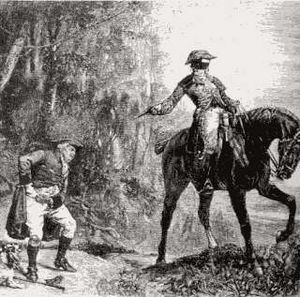William Spiggot facts for kids
Quick facts for kids
William Spiggot/Spigget
|
|
|---|---|
| Born | 1691 or 1692 |
| Died | 11 February 1721 (age 29) |
| Nationality | English |
| Occupation | apprentice to a cabinet-maker or joyner, highwayman, thief, convict |
| Known for | Highway robbery, leader of a gang, his refusal to plead which led to his being pressed (peine forte et dure) and his execution at Tyburn |
William Spiggot (also spelled Spigget) was a famous highwayman from England. A highwayman was a robber who attacked travelers on roads. William Spiggot was caught by Jonathan Wild's team in 1721.
During his court case at the Old Bailey, he first refused to speak or "plead." Because of this, he was sentenced to a very harsh punishment called Peine forte et dure. This meant heavy weights would be placed on him until he spoke. Later, he had a second trial where he pleaded not guilty. He was found guilty and was executed on February 11, 1721, at Tyburn in London.
Contents
William Spiggot's Life
William Spiggot was born in Hereford, England. His father worked at an inn, which was like a hotel for travelers. William was likely married around age 19 and had three children. He said he was learning to be a cabinet-maker or joiner in Hereford. He became well-known for his life as a criminal, especially as a highwayman.
First Court Case and Refusal to Speak
On January 13, 1721, William Spiggot and another person, Thomas Phillips, were brought to the Old Bailey Court. They were accused of highway robberies and violent thefts. When asked to speak in court, they refused. They said they would stay silent until their money, horses, and other belongings were returned to them.
The court reminded them of a law from 1692. This law said that when highwaymen were caught, the people who caught them could keep the stolen horses, money, and other items. Even with this warning, both Spiggot and Phillips refused to speak.
At that time, refusing to plead in court could lead to a severe punishment called Peine forte et dure. This meant being pressed with heavy weights until you either spoke or died. The judge described this terrible sentence to try and make them speak. The idea was that the fear of this punishment would make criminals agree to a trial by a jury. But William Spiggot and Thomas Phillips remained silent. They were then sent back to Newgate Prison to receive their punishment.
Later Court Cases
After being sent back to prison, Spiggot and Phillips were brought to court again. This time, they pleaded not guilty. They were accused of robbing John Watkins on a highway in November 1720. They were said to have stolen many valuable items and money. They were also accused with another person, William Heater, for robbing John Turner in November 1720.
John Watkins said he recognized Spiggot because he had known him for years. However, the gang who attacked John Turner wore masks. Some of the stolen goods from Turner were found where Spiggot was staying. Several witnesses described how difficult it was to arrest Spiggot, saying he was very strong and did not want to give up. Even one of his former partners, Joseph Lindsey, spoke against him in court.
William Heater, who was accused with them, was found not guilty. Spiggot and Phillips even said he was innocent. The jury found Spiggot and Phillips guilty of these crimes, and they were sentenced to death.
William Spiggot was also involved in another court case on the same day. He and William Bourroughs were accused of robbing Charles Sybbald on a highway in August 1720. They were said to have stolen money. Again, Joseph Lindsey, Spiggot's former partner, gave evidence against him. Lindsey said he was part of the robbery. The jury found both Spiggot and Bourroughs guilty in this case too, and they were also sentenced to death.
Execution
After being found guilty in his court cases on January 13, 1721, William Spiggot was sentenced to death. His partner in crime, Thomas Cross (also known as Phillips), was also sentenced to death.
The prison chaplain at Newgate Prison noted that William Spiggot prayed before his execution and seemed truly sorry for his actions. However, his partner Cross caused trouble during the prayers. The chaplain also mentioned that Spiggot rarely cried. He might have only cried when he said goodbye to his son for the last time. Spiggot was very angry at his former partner, Joseph Lindsey, for giving evidence against him. Spiggot said he had once helped Lindsey escape and had protected him.
William Spiggot and Thomas Phillips were both executed on February 11, 1721, at Tyburn in London. Five other people were also executed with them that day.
See also
- Highwaymen and List of Highwaymen for more about these types of robbers.
- Newgate Prison for information on the old prison in London.
- Old Bailey Courtroom where many famous trials took place.
- Peine Forte et Dure, which explains this old punishment.
- Thief-taker for more about people who caught criminals in the past.
- Tyburn Executions for information on the historic execution site.


